Best Tent Heaters For Cold Weather Camping
It can be challenging keeping yourself warm when camping in cold weather. Beyond bundling up in layers, sitting close to the fire, and investing in the proper sleeping bag; tent heaters are another way to keep your body temperature in check.
In this article, we’re going to cover a few basic tricks to stay warm while camping in winter. We’ll suggest how to heat a tent safely and effectively and review some heaters that work well in the coldest temperatures. You’ll learn what features to look for in a portable heating system for tents.
Check out our best cold season camping tips and gear for the ultimate comfort and safety during your winter adventure.
- Related article: Best winter camping tents
- Multiple heat settings
- Wire guard to prevent burns
- Numerous safety features
- Compact design
- Three control settings
- 11 Adjustable heat settings
- The heat shield protects against overheating
- Used as a heater and camp stove
- Heats a large space for up to five hours
- Built-in pressure sensor safety system
How To Stay Warm When Winter Camping
Whether you’re camping in the snow or the temperature took an unexpected dip, no one likes going to bed freezing. Packing proper equipment is the best way to get prepared for a winter camping trip. Before you head off on your adventure, these are a few things to consider:
- Dress in layers: Even in the coldest of temperatures, the sun is going to heat your body during the day; especially if you spend a lot of time moving around. Layers are the easiest way to stay comfortable. The layer closest to your skin should be a moisture wicking fabric like lightweight wool. On top of that you can wear a sweater or down jacket. The outermost layer should be a windproof or waterproof shell; preferably with a hood.
- Wear a hat: Body heat can easily escape from your head. That means that hats will make the most noticeable difference in your comfort level. In winter weather we recommend sleeping with a warm hat that covers your whole head and ears.
- Pack wool socks: Wool is an excellent material that wicks moisture away from the body while still leaving room for ventilation. Pack a few pairs of long wool camping socks to wear both during the day and at night.
- Bring gloves and mittens: You may not want to sleep with mittens on, but they are a must-have for setting your tent up at night and cooking breakfast in the morning. Make sure to pack a durable pair that can handle firewood, rocks and dirt.
- Chemical heat packs: Hand warmers are an inexpensive and often-forgotten piece of equipment that can make a huge difference in your comfort level. You can pick up hand warming packets at most outdoor stores and stuff them in your gloves when your fingers start to get cold.
- Invest in a winter sleeping bag: Many campers invest in a high-quality sleeping bag that is rated to zero degree weather. One thing to be aware of, is these sleeping bags are rated for survival not based on comfort level. That means you’ll still have to take extra precautions like wearing warm clothes and a hat to get a good night’s sleep.
- Pack extra blankets: If you’re car camping, you probably have the luxury of a little extra space in your trunk for blankets. Take advantage of this and bring multiple large, thick outdoor blankets. They work great as sleeping pads. You can put them on a tent floor under your sleeping bag so less heat will escape when sleeping on the cold ground. Pile them on top of your body for maximum comfort, along with space blankets as your top cover. If you have electricity in your tent, you can also use a heated blanket for extra warmth. Electric blankets contain an integrated heating element that allows you to stay warm in very cold temperatures.
- Cuddle up: When camping with a partner that you feel comfortable with, body heat can be the cheapest and easiest way to raise your body temperature a few degrees. Don’t be afraid to sleep close together during a cold night. You might even consider a double sleeping bag!
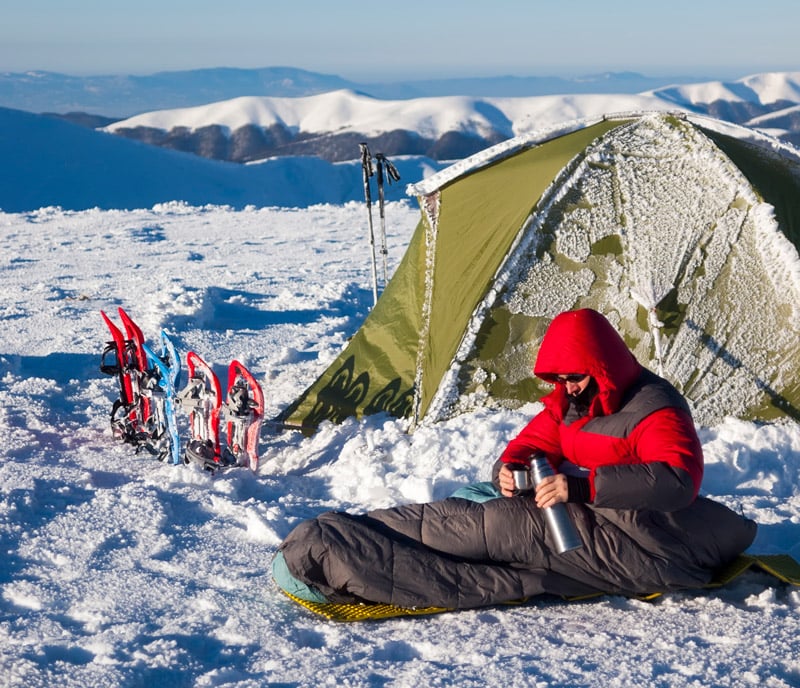
Hot Water Bottle Method
One trick we used to stay warm when winter camping in our camper van conversion was the hot water bottle method. It’s a cheap and easy way to heat your body when you have a tent without access to electric or fuel-operated heaters.
The method works like this: boil some water over a campfire and pour it into a water bottle or covered container. Filling the container 3/4 full is all it takes. Wrap the bottle with a towel or cloth while pouring, and be careful not to burn yourself. Seal the lid tightly, then store it in your sleeping bag next to you at night.
The hot water bottles can stay warm for 6-8 hours, making them a perfect heat source for cold nights.
Winter Sleeping Bags
You’ll want to pack for a 4-season sleeping bag for a camping trip in winter. Down sleeping bags with waterproof and breathable fabrics are going to be the most comfortable. A high volume of loft and fill material will keep you the warmest overall. That’s because there will be more insulation between you and the outside air.
Winter sleeping bags with high quality down (measuring over 800) are going to be able to withstand the coldest weather. But they’re also going to be the most expensive. Picking the right sleeping bag that fits within your budget and temperature constraints is a bit of a balance. If you pack lots of layers and consider the hot water bottle method you will be able to get away with a less insulated bag. These are our top choices for winter camping sleeping bags:
- Top Choice: Hyke & Byke 0°F 625 Fill Hydrophobic Sleeping Bag
- Best Budget Bag: Coleman 0°F Mummy Bag
Double Sleeping Bags
Two person sleepers are another practical method to stay warm in a cold tent. Similar to winter sleeping bags, the warmest ones are going to be filled with breathable down fabrics.
Double sleep sacks are bulkier than single ones–so they’re more difficult to pack. But they work especially well with families or couples that enjoy camping together. These are our top recommendations for double sleeping bags:
- Best 0°F Bag: TETON Sports Mammoth Queen-Size Double Sleeping Bag
- Best Budget Bag: Sleepingo Queen Size Double Sleeping Bag for Camping
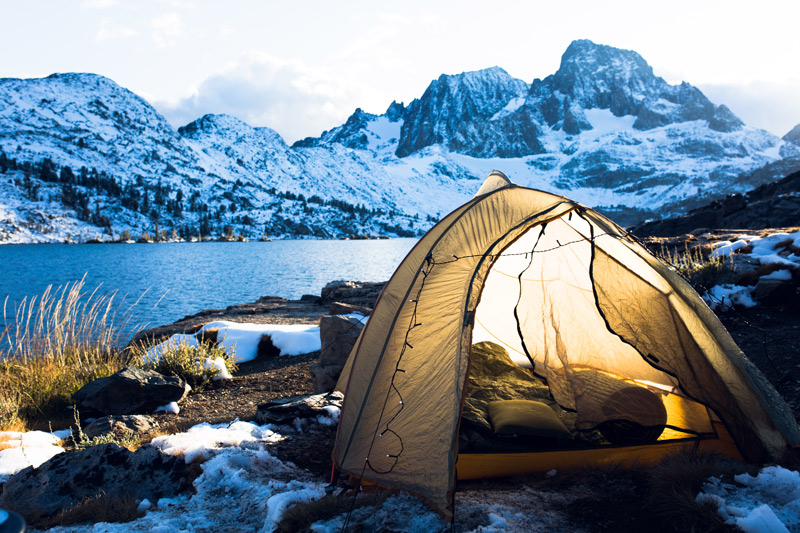
Tent Heaters
The comfort of sitting by a wood stove in cold weather is what draws many campers to hot tents in winter. A wood-burning stove inside a tent creates the coziest atmosphere ideal for adventures in winter landscapes.
In the most extreme conditions, heating for tent is worth consideration, and with a wide choice of heaters, you can create your own warm space.
Tent heaters aren’t standard camping equipment, but there are circumstances in which you’d want to use one. Family camping trips are the perfect example. You might not be able to get the spouse or the kids to “buy in” to a camping adventure in a cold season without the promise of a heater.
Car campers and RV travelers can benefit from a heater because they have the space to pack one.
If you’re camping at an established campground with hookups, a portable electric heater is a safe and convenient accessory thing to bring along.
Finally, it’s good to remember that portable heaters can be used outside the tent as well. With the luxury of a heater, you can set up a warm area next to your picnic table or chair and play cards comfortably; even in cold weather.
A heater would make a great additional heat source when pit cooking over hot rocks providing extra warm air around your camping area.
Types Of Portable Camping Heaters
Electric Heaters
When it comes to portable outdoor heaters, electric-powered heaters are by far the safest. They don’t put out any dangerous gases so you don’t have to worry about carbon monoxide buildup in your tent. You can run them all night long without concern. Such heaters are also easy to adjust so you can keep the temperature consistent.
Some might consider this the best type of heater for camping, but there is a caveat. Electric heating takes a lot of energy to run. You should only use an electric heater for cold season camping if you’re spending the night somewhere with electrical hookups.
Electric Heaters and Solar Power
Often van life travelers will inquire about using an electricity to heat a camper van. Unfortunately, that’s not a very practical solution. Most voltaic heaters use between 500-1,500 Watts of power. And if you stick those numbers in our solar calculator you’ll quickly notice how big of a solar system that would require.
Electric heaters are power hogs. They are not the type of heater you can take too far off grid without draining batteries. For that type of camping experience, you’ll want to look into gas heaters–which are next on our list.
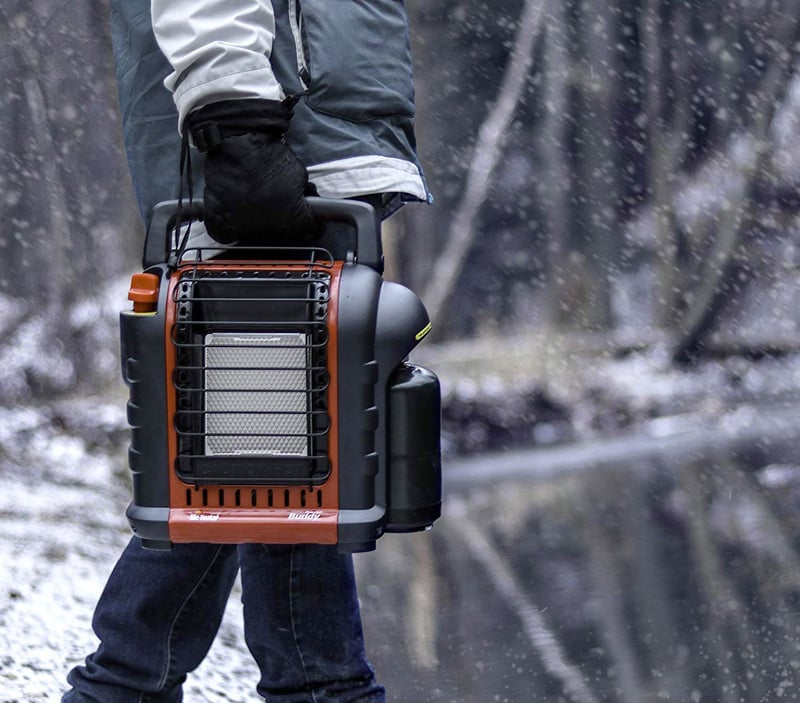
Gas Heaters
Portable butane and propane-powered heaters are the best for primitive camping. They require no electricity to operate, the fuel is inexpensive, and they can get burning hot.
Unfortunately, they release harmful gases such as carbon monoxide, so when you want to heat a tent, it’s essential to take proper precautions regarding airflow. If you use a gas heater inside an insulated tent, you should have all windows open to ensure proper ventilation.
Gas-powered heaters are best for outdoor use or ventilated spaces. They can heat a room up to 300 square feet, so people like to use them in small cabins or ice fishing houses. Another great use is when you want to keep warm while sitting in a chair or hammock at the campground.
Butane vs Propane Heaters
Butane and propane heaters work similarly, but there are a few key differences to keep in mind. For one, consider the type of fuel you’re traveling with. If you are already using propane for cooking, it would make sense to use the same type of fuel for your heater. Propane fuel can come in individual canisters or in larger tanks that can be refilled during travel. Butane canisters are disposable and cannot be refilled.
Butane fuel is denser making it slightly more expensive per BTU to heat. It also does not work as propane in temperatures below 30°F. You may need to warm a butane canister before the flame will ignite.
Both types of gas work well in portable heaters. Generally, butane stoves have a clip-in connector and propane stoves have a screw on connector.
Battery Powered Tent Heaters
Battery-operated heaters might seem like the best option for camping. You can use them to heat a tent without electricity or gas, and they wouldn’t off-gas carbon monoxide. But as we mentioned earlier, heaters require a lot of power to produce heat and keep a tent warm. At this point, battery-powered heaters are simply too impractical and cumbersome to use for any reasonable time.
Until batteries become even more advanced, it’s best to stick with an electric or gas heater.
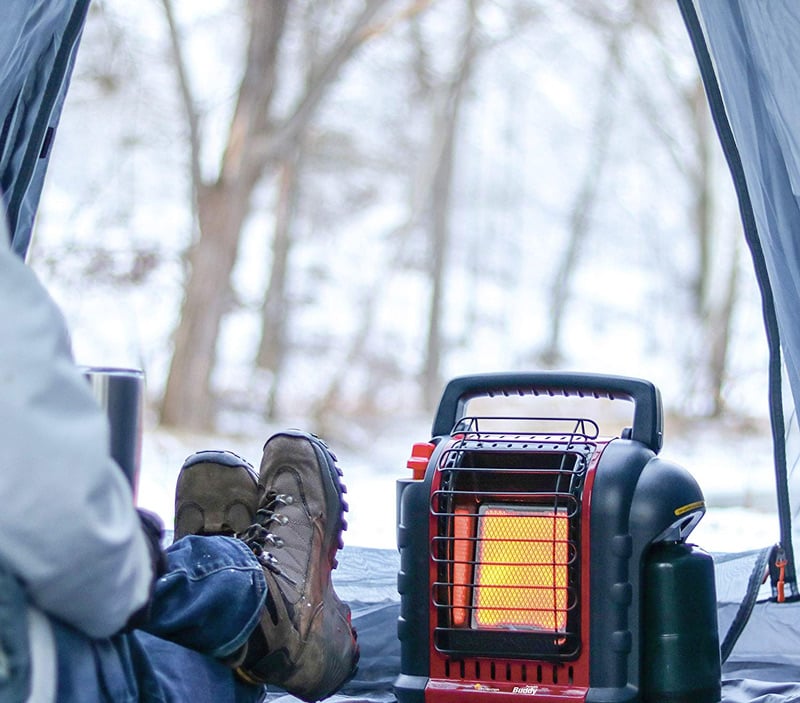
Features To Look For In A Tent Heater
Once you decide on the type of heater that’s best for your trip, it’s time to start looking into specifics. Listed below are some of the main considerations to keep in mind.
Size
While getting the biggest heater possible for your tent may be tempting, it’s important to consider space constraints and your use case.
Space heaters are fire hazards, so they should never be touching you or any linens as you sleep. It’s best to get a small enough unit to stay away from you and other campers during the night, especially when you have a small tent. Small heaters are also going to use less fuel, and they’ll be more portable.
BTUs
Heat output is measured in British Thermal Units or BTUs. For most RVs and campers, an output of 1,000 to 5,000 BTUs is plenty for a camping heater to keep your rig warm on a chilly night. Many tent heater models have an adjustable climate control setting. The lower the heat output, the less electricity or gas it will to use.
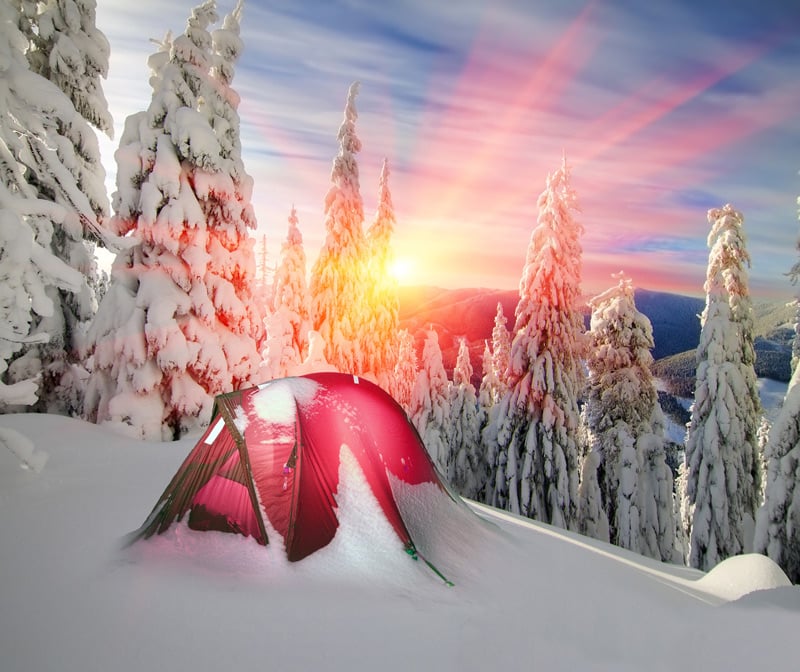
Safety Features
It’s always crucial to consider safety when using a heating device. Gas-powered heaters can produce carbon monoxide, which is tasteless and odorless. When inhaled, it can lead to symptoms such as headaches, weakness, dizziness, blurred vision, nausea, and even loss of consciousness. Therefore, such heaters should always be used in a properly ventilated space.
Many gas heaters have safety features that prevent them from causing problems such as carbon monoxide poisoning. Look for heater with an automatic shut off mechanism. These will turn off the device when oxygen levels drop too low. Some offer a built-in carbon monoxide detector.
Whether you’re using a gas or electric, check to make sure the heater has a tip-over shut off. That can prevent burns or fires by shutting down the heater if it’s not placed in an upright position.
Using A Heater In Your Tent
Every tent heater is different, and the assembly manual should give you detailed instructions as to how to set up your unit. It’s best to place your heater in an area with little foot traffic and well away from any bedding, clothing, or other flammable objects.
Always use your heater at the lowest setting that’s comfortable for you.
Best Tent Heaters Reviewed
We’ve compiled a list of our favorite tent camping heaters based on performance, affordability and features. These heaters are going to make a big difference when it comes to camping in the coldest of temperatures.
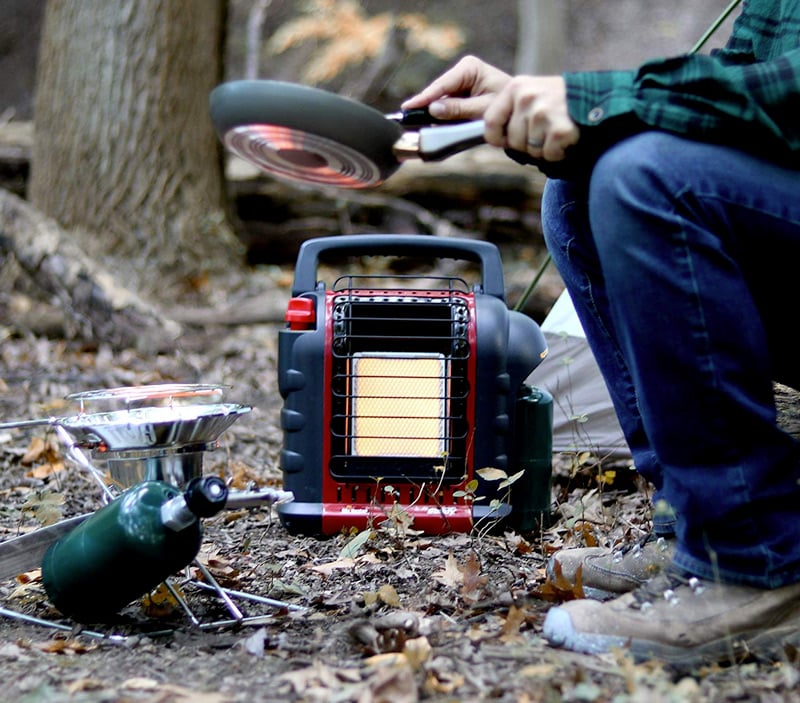
- Multiple heat settings
- Wire guard to prevent burns
- Numerous safety features
- Compact design
Best Propane Heater: Mr. Heater Buddy
The Mr. Heater Buddy portable propane tent heater is the best value when it comes to propane. This heater has two heat settings up to 4,000 and 9,000 BTU per hour. It can efficiently heat spaces of up to 225 square feet which is more than enough for a campsite.
This heater has a variety of safety elements, including a high-temperature wire guard to help protect against burning propane which could catch fire. There’s also a safety shut-off mechanism to guard against carbon monoxide poisoning and an anti-tip-over shut-off switch.
This compact heater has a handle, making it easy to transport and store when not in use. It makes for a great heater when boondocking or camping off-grid.
One thing to keep in mind with this heater, is the low oxygen shut off switch can be triggered by high altitude. You may encounter performance issues when using it above 7,000 feet elevation.
- Three control settings
- 11 Adjustable heat settings
- The heat shield protects against overheating
Best Electric Heater: Lasko Ceramic Portable Heater
The Lasko electric heater is the most adjustable on our list with eleven different temperature settings at the turn of a dial. You can also switch it to fan only depending on the outside temperature.
This heater has no chemical off-gassing and features overheat protection, reducing the risk of fires with prolonged use. A cool-touch exterior helps to ensure that you don’t burn yourself when using the unit.
It can quickly heat a room using up to 1500 Watts of electricity making it ideal inside an RV or tent camping site with hookups.
- Used as a heater and camp stove
- Heats a large space for up to five hours
- Built-in pressure sensor safety system
Best Butane Heater: Camplux
The Camplux Portable Butane Heater has a heat output of 4,400 BTU per hour and can reach its full heating capacity in as little as five seconds. One can of butane can heat your space for up to five hours.
The heater is easy to set up, and it works at multiple angles. The Camplux is versatile, functioning not only as a heater but also a stove, a toaster, and more. It allows you to both warm your entire tent and cook meals at the same time. Just be careful, as there’s little to protect you from burns.
A built-in pressure sensor canister ejection system along with a gas flow cut off mechanism ejects the butane canister at overheating, helping to keep you safe.
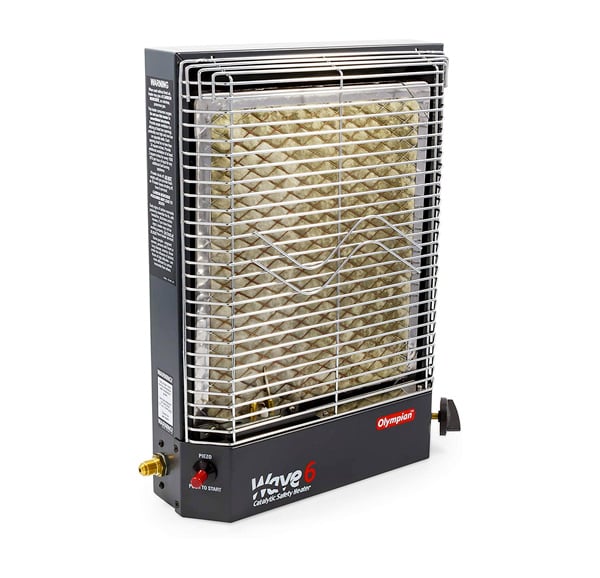
Most Efficient Propane Heater: Camco Olympic Wave 6
While this heater is more expensive than the Mr. Buddy models, it offers everything that you need in a heating source with a highly efficient design. The Camco Olympic Wave 6 is uses a catalytic heating system, making it over 99.9% efficient to help you save money and reduce your carbon footprint.
The heater is adjustable between 3,200 and 6,000 BTU, producing enough heat for up to 200 square feet of space. It operates on low-pressure HD-5 propane gas to ensure safety.
The Olympic Wave 6 also boasts a safety shutoff valve. This prevents accidental non-ignition fuel discharges, keeping your camper safe, secure, and above all, cozy.
Best Personal Propane Heater: Texsport
The Texsport propane tent heater is the smallest and most compact heater on our list. You can use it as a handheld device, or it can attach to a fold-away plastic base for heat from above. It’s designed for the outdoors, adjusting up to 2,890 BTUs making it best for personal use.
It can attach to both 16.4 oz and 14.1 oz propane fuel cylinders. The burner is made of stainless steel for durability, and has a built-in safety grid for ease of use.
While the Texport does have a few safety aspects in place it does lack a tip over switch or low oxygen shut off. That means you’ll have to pay close attention to your surroundings.
That’s A Wrap!
If you’re struggling to stay warm, you may want to invest in a camping heater. When it comes to electric heaters, the Lasko Ceramic heater is our top choice. Mr. Heater Buddy is a great all-around propane heater for off-grid camping. And the Camco Olympic Wave 6 is a good choice when it comes to efficiency.
On a budget? The Texport is the most affordable choice, while the Camplux is the most versatile and can be used for both cooking and heating.
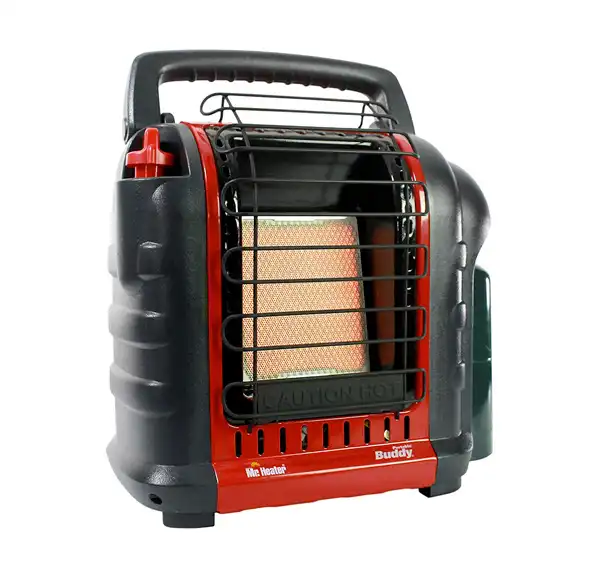
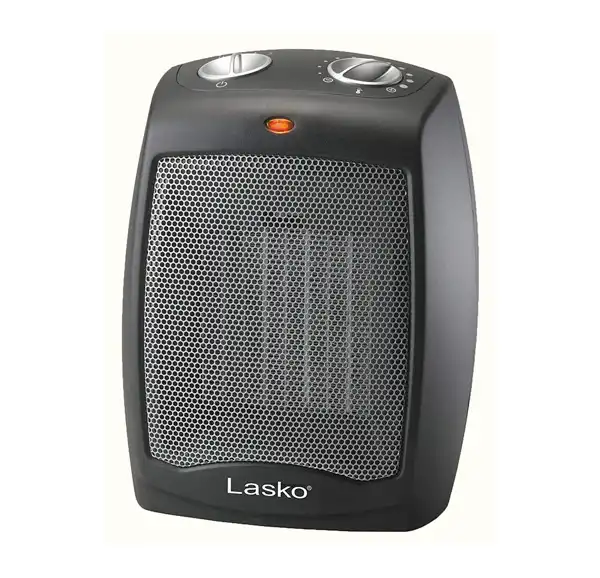
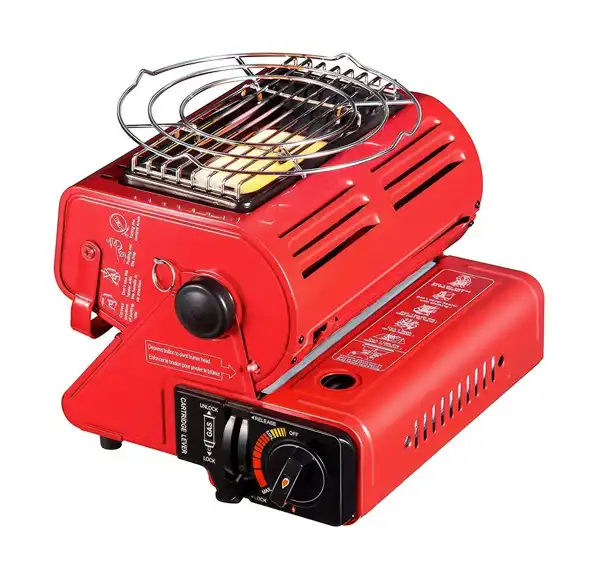
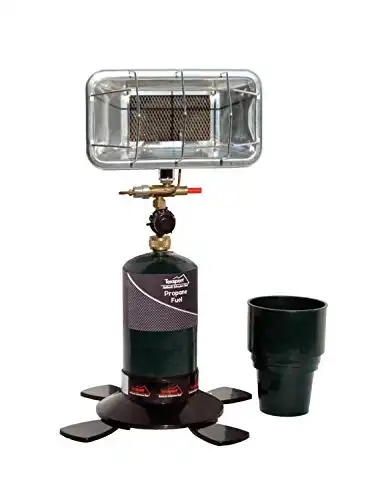
I love to travel and camp. Thanks for sharing this article with us, I enjoyed reading. Keep sharing more with us.
Love to camp both in summer & winter. . Looking for heater & i think i have found the best one for my self (Personal Propane Heater Texsport).
Thanks to Parked in Paradise to sharing this amazing products with us.
-Alvin
Nice article, i just planned a winter camping for this season and this article helped me in deciding to buy the best heater.
Thank you for sharing! Keep it up
Thanks for sharing
Thanks for sharing great list of camping tent heaters. Its really helpful post. A very informative article. I enjoyed reading.